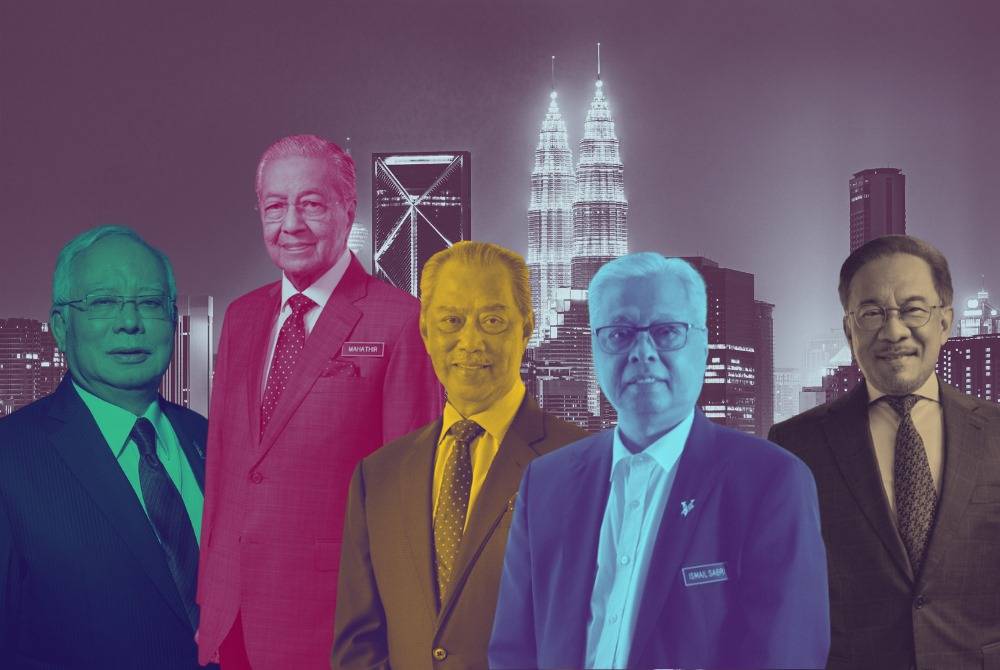Five PMs in six years, now another?

SHAH ALAM - With less than three weeks to go before Sultan Ibrahim Sultan Iskandar of Johor ascends as the 17th Yang di-Pertuan Agong for a five-year term, Malaysia's political scene is heating up.
The country has seen five prime ministers in six years including Datuk Seri Najib Razak, Tun Dr Mahathir Mohamad, Tan Sri Muhyiddin Yassin, Datuk Seri Ismail Sabri Yaakob and Datuk Seri Anwar Ibrahim.
Recent rumours suggest that Anwar's tenure as Prime Minister may be short-lived, with speculations of his potential ousting within the next 48 hours, just weeks after celebrating his Madani Government’s one year milestone.
These rumours originated from the so-called "Dubai Move."
The term "Dubai Move" came into the spotlight in late December following an anti-corruption operation in Kuala Lumpur involving Tun Daim Zainuddin, a well-known politician and businessman with ties to two-time premier Dr Mahathir.
Last week, Deputy Prime Minister Datuk Seri Ahmad Zahid Hamidi confirmed the existence of a meeting in Dubai including flight details of the attendees.
Reports indicate that at least two MPs from Anwar’s coalition attended this meeting.
The opposition is accused of plotting to bribe MPs and orchestrate mass defections to overthrow the government.
A source told Sinar Daily that former Umno vice-president Datuk Seri Hishammuddin Hussein led the move, aiming to persuade leaders from Sabah and Sarawak to switch allegiances.
The source further explained that Muhyiddin had abandoned his ambitions for the premiership, aware that the royals would not endorse him again. The Pagoh MP, he said, has “given up”.
"As a result, Muhyiddin directed his Bersatu deputy Datuk Seri Hamzah Zainuddin to handle the situation, provided the Madani government of PMX-Zahid collapses.
"Hishamuddin, aiming to secure support from BN MPs and connections to the royalties, also involved Ismail, who, though initially reluctant, eventually gave in to the pressure.
"The plan also involved persuading Tan Sri Abang Johari (Abang Jo) from GPS to accept the position of the first Prime Minister from GPS," the source said.
However, the source questioned the logic behind such a move, considering the potential for leadership instability within Parti Pesaka Bumiputera Sarawak (PPBS). He said things were still “fluid” now when it came to the number one post.
Speculations on Abang Jo as the next Prime Minister has been in various conversations since early December and was further “solidified” by Christmas. Sinar Daily, however, has not been able to obtain verification from neither the unity coalition nor representatives from PPBS.
Anwar, addressing the rumours, dismissed their significance, focusing instead on national development and public welfare.
He reiterated this stance when questioned about claims by Kedah Menteri Besar Datuk Seri Muhammad Sanusi Md Nor that Perikatan Nasional (PN) had enough support to topple the government.
Political analysts observe that Anwar's actions are motivated by the need to gain popularity among Malays, a significant political group.
However, the Tambun MP’s efforts seem to have limited success, as indicated by narrow victories in recent state polls and decreased support from Malay voters.
The PN opposition front argued that Anwar's government does not truly represent the Malay majority, who constitute about 60 per cent of Malaysia's population.
Meanwhile, political analyst Afi Roshezry Abu Bakar highlighted that since the Sheraton Move in 2020, attempts to overthrow the government have consistently failed.
He stressed that the Dubai Move has adversely affected the public's perception of the opposition, revealing its incapacity to provide effective checks and balances in Parliament.
"I believe that since the Sheraton Move, those in the opposition or attempting to seize power through covert means just refuse to acknowledge reality.
"These opposition members have been part of the government for an extended period and have become accustomed to the comfort of their zone.
"In other words, they struggle to adapt to the new political landscape. That's the reality," the senior lecturer from University Tunku Abdul Rahman told Sinar Daily.












